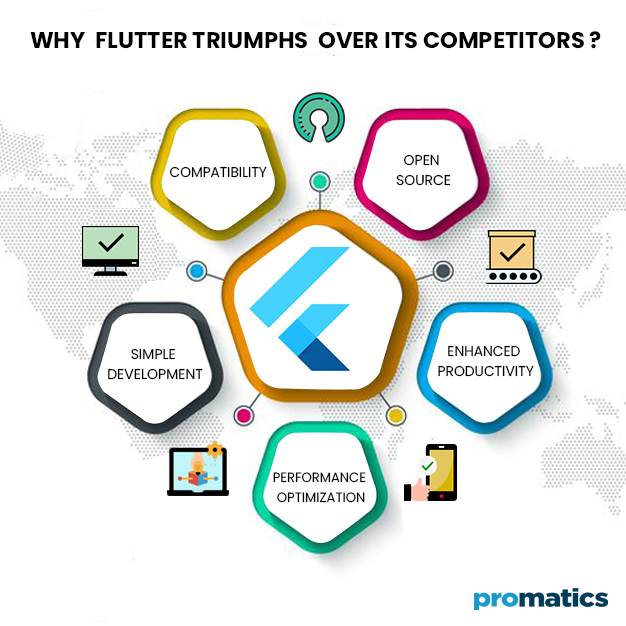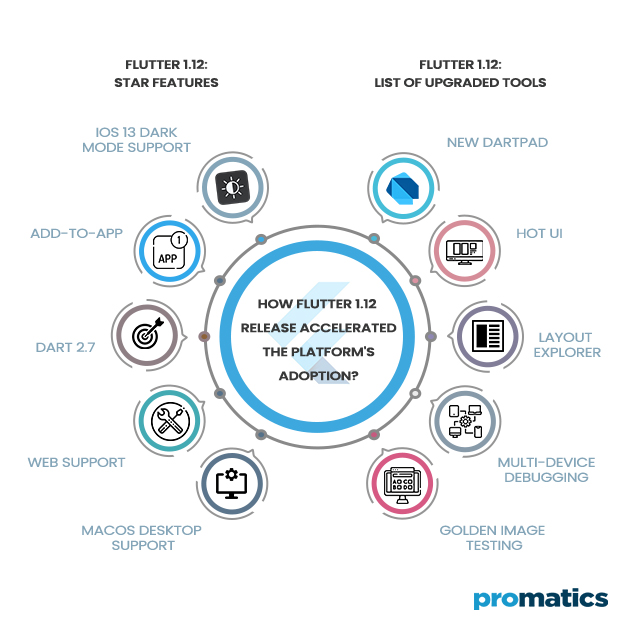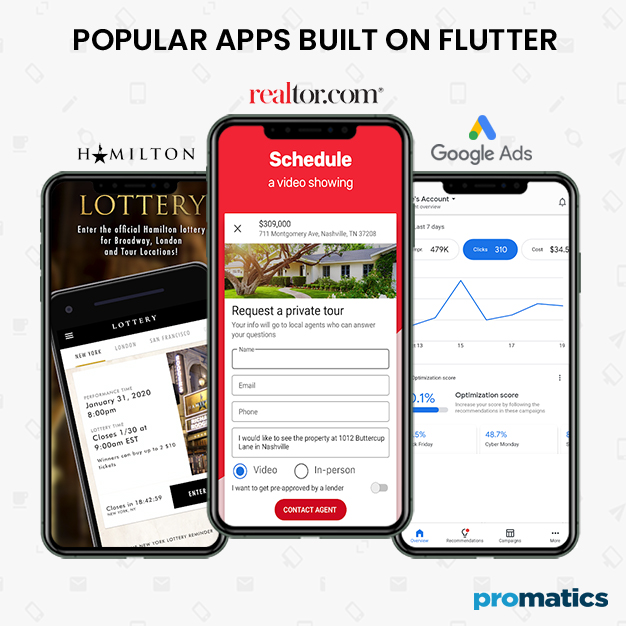The Rise and the Rise of Flutter: Why Flutter has Overshadowed Competition in the Past Few Months?
Why was Flutter Launched?
The innovation at Google never stops. You can expect Google to come up with things they believe have a huge potential. That is how Android was born in 2008 and Flutter in 2017. In its intention to take forward the status quo in mobile app development technology Google published a free, open-source mobile UI application called Flutter. Developers were quickly able to build a native mobile application with just a single codebase using Flutter. It served as a fantastic toolkit for developing different Google platforms.
Flutter offers a comprehensive and functional mobile user interface platform that helps developers to work with single-code Android and iOS applications. It works with a programming language named Dart.
Flutter comprises of two major components:
I. SDK (Software Development Kit): A set of tools that will enable developers to build applications. The devices can be used for translating the code into native machine code (iOS and Android code).
II. A Framework (UI Library based on widgets): A set of reusable UI elements (buttons, text inputs, sliders, etc.) that can be customized to meet business needs.
Before Flutter, Xamarin, PhoneGap, React Native, Apache Cordova, Titanium, and many other frameworks were popular among developers. However, Flutter was developed to offer a superior user experience in a native app. It promises fast-paced development for the benefit of the business. If you compare the three most popular cross platform app development frameworks Flutter comes on top.
Main Advantage of Using Flutter Over Other Frameworks
a.) Open Source
Flutter, along with its programming language Dart are both open source and absolutely free for developers to use. Moreover, there is ample documentation and community support to help out with any issues they may come across.
b.) Enhanced Productivity
Flutter is cross-platform and allows developers to use one single code base for both iOS and Android apps. It helps businesses save both time and resources.
c.) Performance Optimization
App developers appreciate the fact that Flutter is the only mobile SDK that provides a reactive view with the need for a JavaScript bridge. Dart compiles in the form of native code without any need to access OEM widgets, because Flutter has its own. It ascertains less mediated communication between the mobile app and the development platform. Thus, Flutter promises less time to market and even lesser performance issues in-app products.
d.) Simple Development
Flutter offers a ‘hot reload’ feature that allows developers to instantly view changes they make in the code on emulators, simulators, and hardware. In a matter of seconds, the new code is reloaded while the app runs without any need to restart it. Flutter is best suitable for building UIs, adding features, and even bug fixing. Flutter boasts of its simplistic nature and demands no prior programming knowledge from its users.
e.) Compatibility
Widgets are a part of the app and not of Flutter platform itself; thus, there are no or minimal compatibility issues on different operating system versions. It saves the massive time spent on mobile app testing.
How Flutter 1.12 Release Accelerated the Platform’s Adoption?
Flutter 1.12 was released to change the fate of cross-platform development. It also made developers drop what they were doing and check out Flutter. The utility and the power of features introduced with this release were mind-blowing.
Flutter 1.12 Star Features
i.) iOS 13 Dark Mode Support
Flutter was famous for its iconic Cupertino widgets. With the release of 1.12 version, things are set to escalate quickly.
Recently, Apple added a unique Dark Mode in iOS 13. Consequently, Flutter developers optimized the Cupertino widgets to work in perfect sync with the dark mode, while retaining their pixel perfection.
Flutter 1.12 also introduces two new Cupertino widgets, that improve scrollbar fidelity, CupertinoAlertDialog adaptive padding, and added min/max date constraints in the CupertinoDatePicker. All these developments are responsible for a sudden surge in Flutter 1.12’s popularity, resulting in large scale adoption.
ii.) Add-to-App
Add-to-App facilitates the integration of instances built with Flutter, in apps built natively on both Android and iOS. This is one of the most celebrated updates across all cross-platform development technologies.
Such functionalities improve the process of Android development by integrating the Flutter module wizard directly into Android Studio. This simplifies coding generic things into one codebase using Flutter and using it on both iOS and Android. Developers can also maximize performance by making some resource-hungry components natively for each platform.
iii.) Dart 2.7
Dart 2.7 promises a lot of extravaganzas, and Flutter 1.12 is fully capable of utilizing all the benefits that come with the new Dart version. With Dart 2.7, the top new features in Flutter and Dart could be used together to ensure maximum improvement in app development.
iv.) Web support
Flutter can now be used to build incredible looking web versions of a mobile app.
The web app support will give an advantage to Startups and medium businesses alike, as it would reduce both the time and money spent on building a web app from scratch.
v.) macOS desktop support
The version of Flutter aims at capturing the macOS market by letting developers build beautiful macOS desktop apps in the low effort and short time. Flutter focuses strategically to capture the iOS and macOS development markets.
Flutter 1.12: List of Upgraded Tools
a.) New DartPad
DartPad is a popular online tool that allows developers to try the latest Dart features without any need for installations. Among its latest offerings, is the support for Flutter’s web development. Developers are allowed to write code on the left and simultaneously see the program running on the right.
b.) Hot UI
This new feature lets developers directly interact with the widgets being built in the IDE. It allows developers to make changes to both visuals to the code and code to the visuals, all in real-time, and it progresses as it gets built.
c.) Layout Explorer
Layout explorer aims to ease the coding front of the app development process. Developers can interactively change the layout options, reducing things variably depending on your Dart coding proficiency. It simplifies the identification of overflow errors, along with seeing the way to fix them.
d.) Multi-device Debugging
Multi-device debugging is essential to every cross-platform app development tech, and Flutter is novel enough to feature it. It allows developers to debug three different devices, no matter virtual or physical, and Hot reload makes it even better.
e.) Golden Image Testing
Flutter 1.12 introduces implementations of GoldenFileComparator and LocalFileComparator classes. It lets developers compare images by pixels, instead of bits. When updating, developers want to compare the image rendered to the golden image, to ascertain that the result is the same. Golden image testing highlights the differences by pixel comparison, giving developers an exact idea about the differences if any.
Since Flutter 1.12 is an upgraded worked out keeping Android app development and iOS app development in mind, it is being loved and adopted worldwide. Google has simplified the possibility of making stellar apps by adding features to Flutter that require less coding knowledge. Both Dart’s and Flutter’s new upgrades open up unforeseen opportunities in the world of app development.
The Increasing Popularity of Flutter
There are so many leading enterprises that are choosing Flutter to make beautiful apps in a streamlined fashion. Google Trends ranks Flutter as the second most leading language, followed by React Native for developing cross-platform mobile applications in 2020.
In December 2019, Flutter on Github surpassed React Native in GitHub Stars.
A Stackoverflow survey ranks Flutter as the third most loved frameworks, libraries and tools followed by .Net Core and Torch.
Why is Flutter the Preferred Choice for App Development?
The choice of Flutter over other Native app development frameworks does not come as a surprise in the world of app development. It leverages Google’s in-house Dart language and offers the best design widgets to develop high-performance cross-platform apps on a low budget. Now when the myths surrounding cross mobile app development platforms have largely been busted Flutter is attracting even native mobile app developers to its flock.
1. With Flutter, developers can build apps for both major platforms like Android and iOS with a single codebase, thus offering a cost-saving recluse during the development phase.
2. It comes with an efficient yet portable GPU rendering UI that allows developers to work on multiple interfaces.
3. The Hot Reload features will enable one to accelerate the app development process by featuring real-time changes in coding.
4. It supports diverse IDEs including Visual Studio Code, Android Code and Xcode.
5. With a single codebase set to review and test, Flutter cuts short on the testing time.
Popular Apps Built on Flutter
A.) Realtor.com
A distinguished full-fledged real estate app for buyers and sellers as well as professional realtors. Realtor keeps a tab on the market pulse for real estate sector like no one else does. The Realtor app build on Flutter is now a user-friendly app that scaled well. It could reload in a matter of seconds, thanks to the platform and could be released with the same features to Android and iOS.
B.) Google Ads
Yes your very own Google ads mobile app has been recently released having fully built on Flutter. The app helps users manage ads and control various features which are also available in the website. Using Flutter to Google ads saved a lot of time on the development cycle without any compromise on quality. It ascertains that the performance of the final app feels like native. The use of Flutter also makes the app pixel perfect, making it look good on various devices. Finally if Google is using Flutter to build its own products you can be assured of its quality.
C.) Hamilton App
Hamilton is the official app of the hit Broadway musical – Hamilton. It features daily lotteries, exclusive news, videos, a trivia game, merchandise store, and much more on the engagement front. The widgets and developer APIs that Flutter provided were well-thought and predictable. Dart has support for JIT and AOT builds, so developers could Hot Reload and iterate faster on development mode. The fact that they could ship a natively-compiled app and fast release build when it was time to publish the app is fantastic.
Flutter in 2021 and Beyond
Touted as the best cross-platform for mobile app development, Flutter’s ongoing demand and recognition are set to increase in the upcoming years. Here are some futuristic trends that Flutter promises:
I.) Flutter for Web Apps
The flutter community is stressing on the Hummingbird project. If successful, a single codebase for websites and apps will be soon available.
II.) Flutter for Desktop Apps
The flutter community is constantly working on capturing the world beyond just mobile apps. The focus is on making the flutter apps compatible with desktop as well. In the future, you can see flutter apps for macOS, Linux, and Windows.
III.) Flutter for Embedded
In 2020, the Flutter community is promising more stable innovations. There is a likelihood of more advanced IoT technology to be embedded with this framework.
A game-changer in the world of cross-platform mobile app development, Flutter serves as the best-in-class among all mobile app building tools. Developers prefer it for both offshore and onshore projects.
We at Promatics, specialize in the use of Flutter for cross-platform development as it is less complicated than React Native and easier to use. As a platform, we appreciate that it takes less time for app creation and requires fewer efforts and smaller investments. It is well suited for new apps that don’t need deep hardware or OS integrations. Flutter’s renderer is very fast, and it does not have the same limitations for performance or security that other frameworks pose.
Flutter lets you cover two app platforms, in less time and ease of development, if this is not win-win, we don’t know what is!
Still have your concerns?
Your concerns are legit, and we know how to deal with them. Hook us up for a discussion, no strings attached, and we will show how we can add value to your operations!



